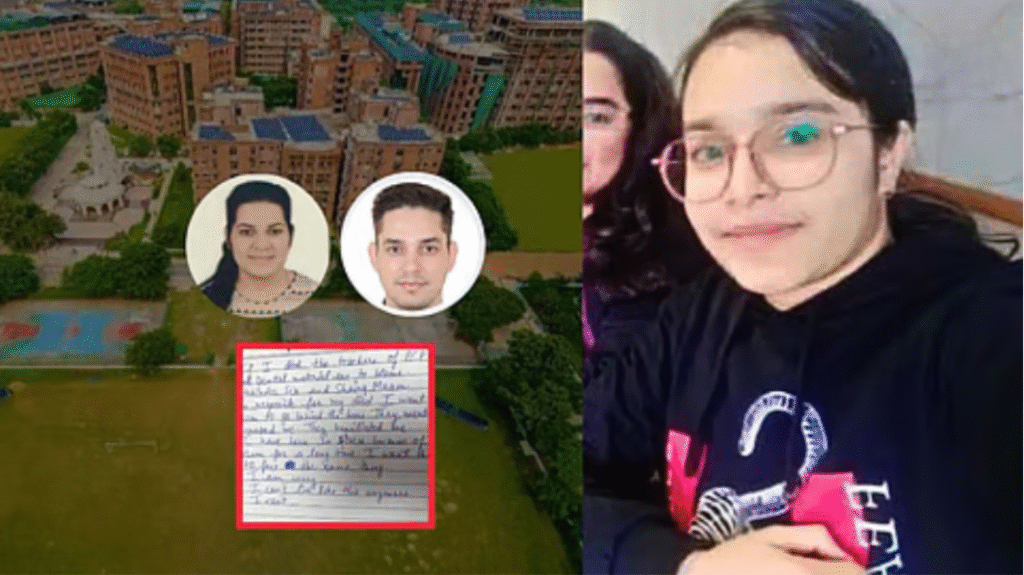A heartbreak unfolded at Sharda University, Greater Noida, on July 18, 2025, when a 20-year-old second-year BDS student, identified as Jyoti Sharma from Gurugram, was found dead by suicide in her hostel room. The incident has rocked the campus, triggering protests, arrests, and intense scrutiny of university protocols for handling student stress and faculty-student grievances.
🔍 Suicide Note Sparks Outrage
Two faculty members—Mahinder Singh Chauhan and Shairy Vashist—were named in Jyoti’s handwritten suicide note. She accused them of prolonged mental harassment, public humiliation, false forgery claims, and threats of failing her. A batchmate recalled how Jyoti was accused of forging a signature in class, “left in tears” when humiliated.
In her note, Jyoti wrote:
“They mentally harassed me. They humiliated me. I have been in this stress for a long time. I want them to suffer the same… Sorry, I cannot live anymore.”
🚔 Arrests & FIR Filing
Following the note, Greater Noida police swiftly registered an FIR naming five staff members, including the two professors mentioned in the note, the dean, HOD, and other officials. Chauhan and Vashist have been arrested and suspended pending investigation. The remaining named individuals are under scrutiny.
🧑🎓 Student Protests & Family Uproar
Jyoti’s grieving family and fellow students protested vigorously at the campus gate. They alleged police used force to disperse the gathering. Her father, after meeting faculty, claimed teachers continued to mistreat Jyoti even after lodging complaints. Her mother staged a sit-in protest demanding justice and accountability.
🎓 University’s Position & Probe Initiated
Sharda University spokesperson confirmed formation of a high-level inquiry committee led by the Vice Chancellor. Sharda university says it is fully cooperating with authorities, has suspended the accused staff, and will act on committee recommendations.
🤝 Campus & Legal Ramifications
- Mental health spotlight: Students and families are questioning whether Jyoti’s demands for empathetic support were ignored and whether campus systems failed to protect her.
- Institutional neglect: Comparisons are being drawn with other cases like Odisha’s Odisha self-immolation, highlighting widespread challenges in handling harassment complaints.
- Administrative accountability: Investigations will focus not only on the accused faculty but also on whether the university’s mental health and grievance redressal mechanisms were inadequate or complicit.
🛠️ What Needs to Change
- Robust grievance redressal: Universities must enforce swift, transparent mechanisms—well beyond the Internal Complaints Committee (ICC)—to address student concerns.
- Mental health initiatives: Regular counseling, peer support, and anti-harassment training for staff are essential.
- Faculty behaviour norms: Clear conduct guidelines, training on student sensitivities, and consequences for misconduct.
- Rapid institutional response: Universities must act decisively on complaints and ensure student safety and dignity.
🔮 The Way Forward
- Police and judicial oversight: The legal process will determine if faculty are culpable and if institutional negligence occurred.
- University reform: Recommended actions may include setting up independent oversight bodies, counseling cells, and external audits on grievance systems.
- Awareness and training: Instituting mandatory mental health and harassment training for faculty and administration is crucial.
✅ Final Thoughts
Jyoti Sharma’s death is a jarring reminder that mental harassment and academic pressure can have devastating consequences if not addressed. It is sorrowful that a bright young student felt so engulfed she saw no escape. Her story shouts for reform—in safe grievance channels, compassionate classrooms, and accountable institutions.
Educational institutions must commit to fostering emotionally healthy environments, ensuring missteps are not ignored until tragedy strikes. A culture that prioritizes empathy is critical for truly nurturing future professionals.
To read more Indian Laws and news, visit Legal Guide India



